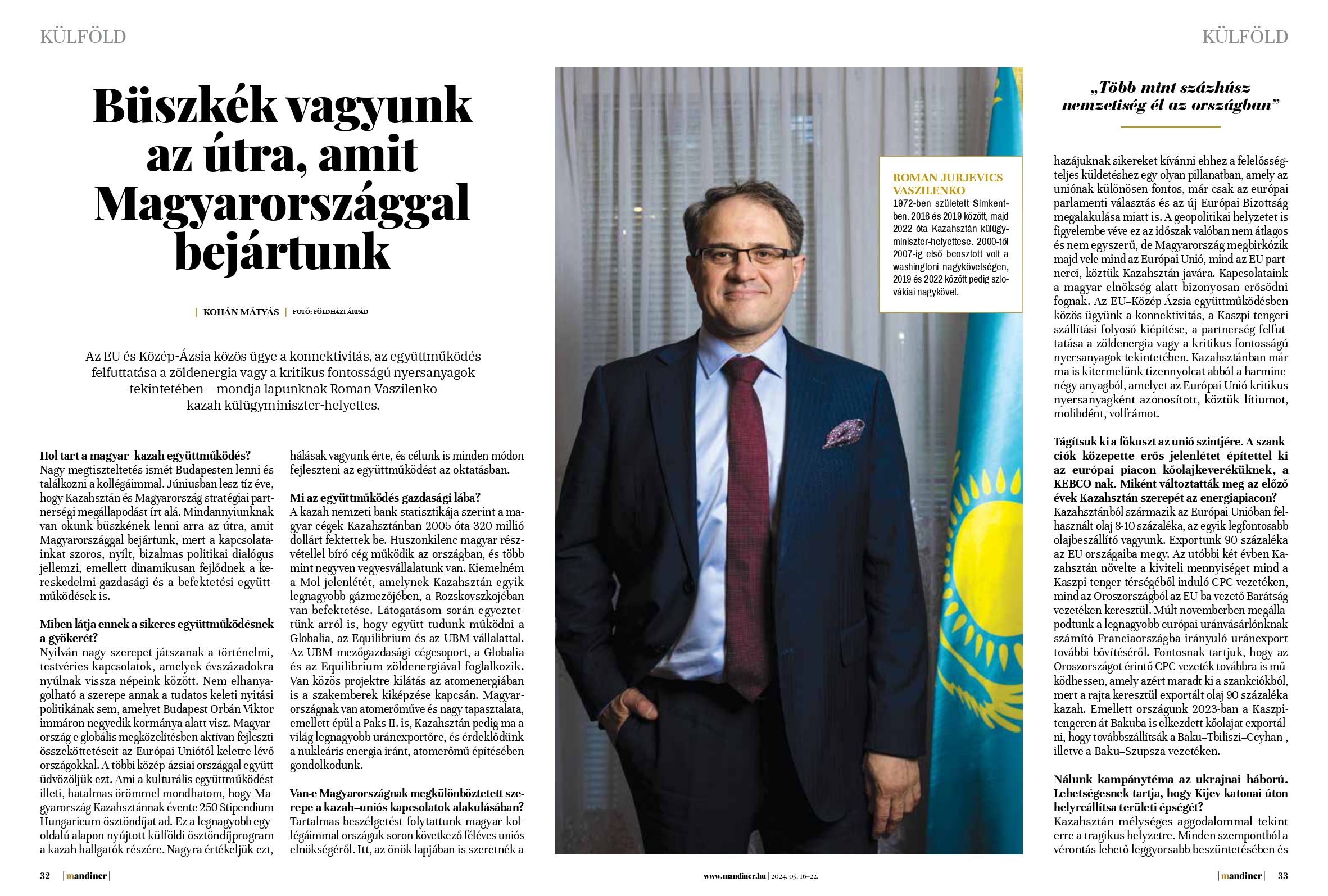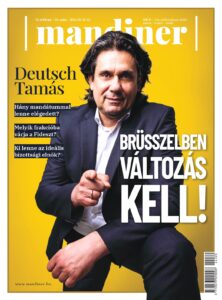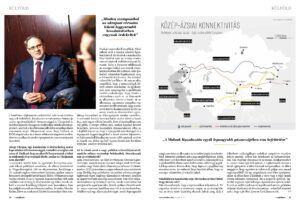ASTANA — We have every reason to take pride in the long journey we have shared with Hungary, said Kazakh Deputy Foreign Minister Roman Vassilenko in an interview with Hungary’s Mandiner weekly magazine during his working visit to Budapest earlier this month.

In the interview, Vassilenko highlighted several key points of Kazakh-Hungarian cooperation, including the dynamic trade and economic partnership, significant Hungarian investments in Kazakhstan, and collaborative efforts in nuclear energy. He also emphasized the historical ties and strategic dialogue between the two nations and outlined Kazakhstan’s crucial role in the European energy market. Additionally, Vassilenko discussed recent political reforms in Kazakhstan, underscoring the country’s commitment to strengthening the rule of law and enhancing democratic processes.
Celebrating ten years of strategic partnership
Vassilenko summarized the results of Hungarian-Kazakh cooperation, noting that this June, Kazakhstan and Hungary will mark ten years since they signed an agreement on a strategic partnership.
“We have every reason to take pride in the long journey we have shared with Hungary. Our relationship is marked by a close, open, and trusting political dialogue between our leaders, as well as dynamic trade, economic, and investment cooperation,” he said.
Last year, political contacts were notably active. President Kassym-Jomart Tokayev and Hungary’s then President Katalin Novák met twice, while Prime Minister of Hungary Viktor Orbán made an official visit to Kazakhstan last November. In the same month, Deputy Prime Minister and Minister of Foreign Affairs of Kazakhstan Murat Nurtleu visited Budapest to hold the Strategic Council meeting with his counterpart, Deputy Prime Minister Mihály Varga.
 “I would like to note that there is a very open and trusting dialogue between Kazakhstan and Hungary,” Vassilenko said.
“I would like to note that there is a very open and trusting dialogue between Kazakhstan and Hungary,” Vassilenko said.
When asked about the root of such successful cooperation, Vassilenko pointed to the centuries-old traditional ties and fraternal relations between the people of both countries. He also highlighted Hungary’s “Opening to the East” policy under the current government of Orbán.
“Hungary is actively pursuing a global strategy by strengthening its relationships with countries to the east of the European Union (EU). In the countries of Central Asia, we only welcome this approach,” he said.
Economic cooperation and investments
Economic cooperation was also a key focus of the interview. Vassilenko provided details and data that illustrate the success of the economic partnership between the countries. According to the Kazakh National Bank statistics, Hungarian companies have invested $320 million in Kazakhstan since 2005. There are 29 companies with Hungarian participation and their representative offices in Kazakhstan, as well as more than 40 joint ventures with Hungarian participation.
“I would like to highlight the presence of the MOL company, which is an investor in one of Kazakhstan’s largest gas condensate fields, Rozhkovskoye. During my current visit, we discussed potential cooperation with companies such as Globalia, Equilibrium, and UBM Group. UBM is an agricultural company, whereas Globalia and Equilibrium focus on green energy,” Vassilenko said.
The deputy minister also reiterated that the countries are exploring opportunities for nuclear energy and specialist training.
“Hungary boasts a nuclear power plant with considerable operational expertise and is currently in the process of constructing a second unit, Paks-2. Meanwhile, Kazakhstan, the leading global producer and exporter of natural uranium, is showing keen interest in advancing its nuclear energy sector and building its own nuclear power facility,” he said.
Hungary’s role in Kazakhstan’s expanding EU relations
Vassilenko also addressed Hungary’s role in Kazakhstan’s approach to expanding its relationship with the EU. Hungary is expected to take over the Presidency of the European Council in the second half of this year. Vassilenko wished Hungary success in this responsible mission, especially given the critical moment for the EU with upcoming elections and the formation of a new commission amidst a complex geopolitical situation.
“The current moment presents unique challenges, yet we are optimistic that Hungary will effectively manage this task to the benefit of both the EU and its partners, including Kazakhstan. We are confident that relations will flourish during Hungary’s tenure as the EU Presidency,” he said.
 Regarding priorities for EU-Central Asia cooperation, Vassilenko mentioned common themes such as expanding connections, developing the Trans-Caspian International Transport Route, and cooperation in clean energy and critical raw materials.
Regarding priorities for EU-Central Asia cooperation, Vassilenko mentioned common themes such as expanding connections, developing the Trans-Caspian International Transport Route, and cooperation in clean energy and critical raw materials.
“Kazakhstan already produces 18 of the 34 such materials that the EU defines as critical raw materials. These are lithium, molybdenum, tungsten, cobalt, and so on,” he said.
The conversation delved deeper into Kazakh-EU relations, particularly the export of oil and Kazakhstan’s evolving role in the European energy market under sanctions. According to Vassilenko, Kazakhstan accounts for 8-10% of the oil consumed in the EU, making it a significant supplier.
“Ninety percent of our exports go to the countries of the EU. Over the past two years, Kazakhstan has increased its export volumes, both through the Caspian Pipeline Consortium (CPC), which runs from the Tengiz field to the Russian port of Novorossiysk on the Black Sea, and through Russia via the Druzhba pipeline to supply our oil to Germany to the Schwedt refinery,” Vassilenko elaborated.
He also highlighted an agreement reached last November to expand uranium exports to France, the largest buyer of Kazakh uranium in Europe. Vassilenko stressed the importance of continuing the CPC pipeline’s operation, which has been removed from the sanctions, as 90% of the oil exported through it is Kazakh oil.
“From 2023, Kazakhstan also began exporting oil westward across the Caspian Sea to Baku for further transportation via the Baku-Tbilisi-Ceyhan and Baku-Supsa pipelines,” he added.
Recent reforms in Kazakhstan
The interview also touched on recent reforms in Kazakhstan. When asked about the results of these reforms, Vassilenko noted that significant changes have been made over the past five years. President Tokayev gave a special impetus to wide-ranging reform in March 2022 proposing large-scale constitutional amendments later supported by a national referendum in June 2022. Before this, four packages of political and social reforms had been implemented, resulting in changes to one-third of the state’s Constitution.
“As a result of recent reforms, Kazakhstan witnessed several election campaigns. Notably, representatives from six political parties, including openly oppositional ones, secured seats in Parliament for the first time. Historically, the nation had never seen such a diverse representation of parties in its legislative body,” Vassilenko said.
He pointed out that the Constitutional Court was restored, serving as the highest body responsible for compliance with the Constitution and human rights. More than 1,500 appeals have already been submitted to the Constitutional Court for clarification and decisions on rights issues.
“This is a significant stride in bolstering the rule of law in Kazakhstan. People believed, and continue to believe, that the country is changing for the better,” he concluded.

